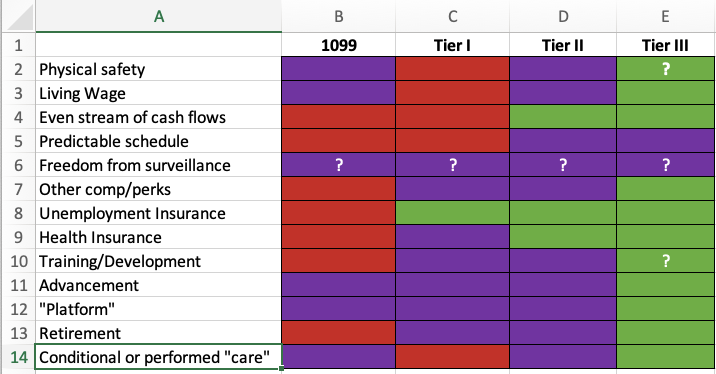Do the Right Thing: On Management #43
The present normal has taken another big shift. I’m heartbroken, outraged, and remain committed to co-creating a different and better future world.
Thank you for inviting me to your in-box.
Managing a remote team in the present normal
Back in March, Cole Krumbholz mentioned that he had assigned six weeks of work to folks on his team.
At the time, many in my circles didn’t know whether they’d have a job in six weeks.
I’m always a fan of setting clear goals. But right now, it’s a solid leadership move to clarify expectations so concretely.
Cole is a co-founder of Formspree, a remote-first company working in multiple countries and time zones. Among other things, we talked about how listening inspired his course of action, and the importance of working flexibly with people who remote, and are in various “stay at home” realities.
I edited our conversation, heavily, for focus, clarity, and brevity.
Formspree is a form tool for web developers that powers forms on over 50,000 websites. Prior to co-founding Formspree, Cole was a product manager at Squarespace, founded a mobile game company, and was a naval officer. Cole lives in Brooklyn.
You can’t delegate responsibility
Cole and I also talked about a leadership principle he learned in the service: you can delegate authority, but you can’t delegate responsibility.
In practical terms, there’s no “set it and forget it” mode for what people on your team are getting done. You don’t just give someone a goal and walk away from it.
You own the outcomes.
“The buck stops here,” is a Harry Truman quote from the 1940s. “I don’t take responsibility at all,” will likely live on in US Presidential history, too.
The US President, the US Attorney General, the US Secretary of Defense, and the NYC mayor are showing the world what leaders should not do.
This is a tragedy.
General Eisenhower’s handwritten note saying that if D-Day landings fail, the "blame or fault...is mine alone”—this week 1944: pic.twitter.com/ReaHljSuoK
— Michael Beschloss (@BeschlossDC) June 4, 2020
Louder than white words on a black background
BikeCo, Fuji's North American distributor, has made a full statement. Available here: https://t.co/il3unxHu1R pic.twitter.com/o7mGncap0w
— Fuji Bikes (@FujiBikes) June 5, 2020
Moral courage
This week, organizations rushed to publish position statements to affirm that they value Black people and their lives.
A critical, cynical, fearful version of me wants to call this out as a very particular flavor of missionwashing.
And yet.
Action and accountability lie in the gap between a branding message and a visionary statement.
Workers are holding corporate and institutional feet to the fire: members of the media. Famous actors. University students. Public servants, past and present.
Moral courage is at play in these workplaces, just as it is in the bodies and voices of protestors around the world.
Looking for a definition of moral courage, I fell into a bunch of internet rabbit holes. I emerged holding a copy of The Right Thing to Do: A Guide for Engineering Students, by P. Aarne Vesilind.
Vesilind was an engineering professor and award-winning teacher. His slim volume strikes me as something he might have written to use in his own classes.
He elegantly builds the case for ethical decision making, and uses brief case studies to illustrate moral courage and its absence — and points out that acting with moral courage may cost you.
In personal ethics, whether or not you take action is a matter for your own conscience. In engineering ethics, action is mandatory, especially where the heath, safety and welfare of the public are concerned.
The Right Thing to Do: A Guide for Engineering Students, by P. Aarne Vesilind
At some point in the last 20+ years, in tech we started describing some who write software as “engineers.”
There have been examples of employees at Google, Facebook and other tech companies who put their jobs on the line to seek change from the inside.
Still, the world of “move fast and break things” seems unwilling to break itself, or move less than glacially, for the health, safety, and welfare of the public.
And tech leaders certainly don’t seem willing to make product decisions that center the health, safety and welfare of our Republic.
Question
How do my organization’s resources and actions affect the health, safety and welfare of the public?
Links
- “How many of my Black brothers and sisters — especially in tech — can say that their White colleagues acknowledge the current state of racial injustice in America?”
My White Boss Talked About Race in America and This is What Happened, by Mandela SH Dixon. - “Today, amidst the onslaught of a pandemic and sputtering leadership responses, we praise those in many roles as heroes, those who make special sacrifices on our behalf, even risking their lives to care for the stricken or to supply the well with food. They hold the system, indeed our society, together. They deserve our praise. No question. They deserve more, however. They deserve not to be heroes.”
The Problem with Heroes, by Gregory Shea at Knowledge@Wharton. - “Decide as a group whether or not to record the meeting. Often, we default to ‘norecording’ if only one person doesn’t want it, but this shouldn’t be automatic. Other participants might find a recording to be really helpful. Work this out together.”
One of many good tips for Bringing Feminist Practices into Your Online Meetings, by CV Harquail. (I interviewed CV last fall.) - “None of these people is perfect. But Lee makes it possible for us to understand their feelings; his empathy is crucial to the film, because if you can't try to understand how the other person feels, you're a captive inside the box of yourself.”
Do the Right Thing, Roger Ebert’s 2001 review of Spike Lee’s 1989 film.
Lists
When I launched this version of my newsletter in 2015, it was a reading guide for people managers. Though I’ve expanded my mandate, one key premise remains: you have to read the right things, and read them critically.
So I love that people are sharing reading lists about racism, Black liberation and white supremacy.
- Check the lists at The Lit. Bar, the only indie bookstore in the Bronx. It’s woman owned.
- This List Of Books, Films And Podcasts About Racism Is A Start, Not A Panacea by Isabella Rosario at NPR’s Code Switch.
- Black Liberation Reading List, via the Schomburg Center for Research in Black Culture of the NY Public Library.
- What to read, listen to and watch to learn about institutional racism, via PBS NewsHour.
I’m currently reading Ijeoma Oluo’s So You Want to Talk about Race ( available at The Lit. Bar.)
Would you like to read this book, together? If you’re curious/interested, please send me a note.
Another key premise: there’s a limit to what we can learn by reading. Sooner or later we have to embody what we’re learning.
So I also respect this word of caution about reading lists: What Is an Anti-Racist Reading List For? by Lauren Michele Jackson at Vulture.
Kudos
Congratulations, Yvahn Martin, for ten years of service on the board of Urban Bush Women.
UBW’s work helps people make sense out of the world and prepare to take action in it.
Also, Yvahn helms one of my favorite Twitter feeds.
Race is woven into the fabric of our professional lives. Those who don’t want to see race, or its impacts, are not going to lead us to where we are going.
May you, yours, and all beings have peace, good health, freedom, and safety.
Anne Libby
P.S. ICYMI
- Warm Take: Failures of Empathy. May 31, 2020
- Warm Take: On Layoffs. May 10, 2020
- Information supply chain, interrupted: Members Only #15
- Meeting a Present Normal: On Management #42
- The rest of the archive

Saturday morning, near the suburban Chicago town I grew up in, I thought about my aunt and uncle, both gone now. In the 60s, my uncle was a Presbyterian minister in a southern city. Many years later, my aunt told me about making meals for Freedom Riders as they came through town. I wish they could both see all of this.




